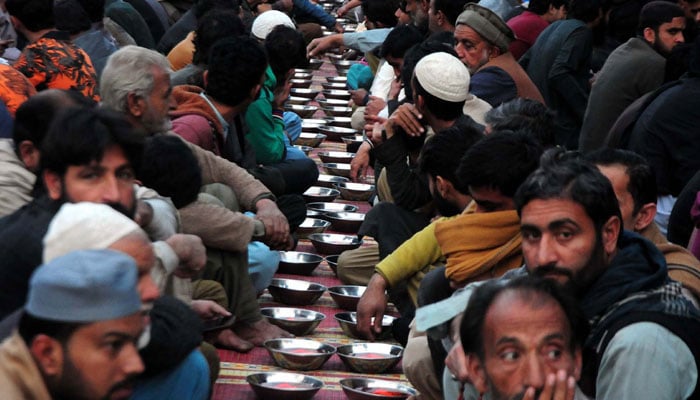Patients with decreased function of kidneys need extra care while fasting
Islamabad: Patients suffering from any of the kidney diseases or having kidneys with decreased function may develop severe complications leading to irreparable loss in case of carelessness while opting for a month-long fasting in the holy month of Ramazan.
According to health experts, the patients having kidneys with decreased function are at a greater risk of developing serious and even life-threatening conditions particularly when they fail in assessing severity of their disease and opt for fasting without prior consultation with their physicians. Kidney diseases are considered as the silent killers. Different forms of kidney diseases include urinary tract infection, cyst around kidneys, kidney stones, acute kidney injury and chronic kidney disease (CKD), highly dangerous because a patient of CKD may not have any symptoms until considerable, often irreparable damage to the kidney has occurred.
Studies reveal that kidney damage or decreased function that lasts for more than three months is called CKD. With the damage to kidneys, waste products and excess fluid starts building up in the body causing swelling in ankles, vomiting, weakness, poor sleep and shortness of breath. If the symptoms are left untreated, the diseased kidneys may stop functioning completely that is potentially a serious and life-threatening condition.
Experts say that the patients with CKD must consult their physicians and undergo complete medical check-up while opting for fasting for a month. Patients with decreased function of kidneys must avoid dehydration while fasting because dehydration is one the most common causes of acute kidney injury, the sudden loss of kidney function that is also called as acute renal failure, a life-threatening condition. Kidneys perform a number of life-sustaining roles in the body from cleansing blood from waste and toxins to maintaining balance of salt and minerals in the body and thus regulating blood pressure. Healthy kidneys maintain a balance of water and concentration of minerals such as sodium, potassium and phosphorus in the blood and remove waste by-products from the blood after digestion. Kidneys produce rennin, an enzyme that helps regulating blood pressure. They also produce an active form of Vitamin D, needed for the health of bones while stimulate red blood cell production.
Health experts say that the patients suffering from type 1 or type 2 diabetes and those suffering from hypertension are at greater risk of developing kidney-related problems if they do not take extra care while fasting. Studies reveal that diabetes and high blood pressure are the most common causes of CKD. A patient of decreased kidney function should immediately report to the nearest healthcare facility in case of developing any complication while fasting. The patients suffering from urinary tract infections, milder kidney stones and cyst can fast during Ramazan but after advice from their physicians.
Experts say that if the kidney stones are silent and are not causing pain, the patient can fast but if there is pain due to stone, the patient should seek treatment and advice before opting for fasting. Dehydration among patients of acute kidney injury can further damage the kidneys. Similarly, the patients with chronic kidney disease having high blood pressure and blood sugar may suffer irreparable loss if opting for fasting without proper advice from a qualified physician.
-
 South Korea: Two Killed As Military Helicopter Crashes During Training
South Korea: Two Killed As Military Helicopter Crashes During Training -
 Elon Musk Unveils SpaceX’s Moon-first Strategy With ‘self Growing Lunar City’
Elon Musk Unveils SpaceX’s Moon-first Strategy With ‘self Growing Lunar City’ -
 Donald Trump Slams Bad Bunny's Super Bowl Performance: 'Absolutely Terrible'
Donald Trump Slams Bad Bunny's Super Bowl Performance: 'Absolutely Terrible' -
 Jake Paul Criticizes Bad Bunny's Super Bowl LX Halftime Show: 'Fake American'
Jake Paul Criticizes Bad Bunny's Super Bowl LX Halftime Show: 'Fake American' -
 Prince William Wants Uncle Andrew In Front Of Police: What To Expect Of Future King
Prince William Wants Uncle Andrew In Front Of Police: What To Expect Of Future King -
 Antioxidants Found To Be Protective Agents Against Cognitive Decline
Antioxidants Found To Be Protective Agents Against Cognitive Decline -
 Hong Kong Court Sentences Media Tycoon Jimmy Lai To 20-years: Full List Of Charges Explained
Hong Kong Court Sentences Media Tycoon Jimmy Lai To 20-years: Full List Of Charges Explained -
 Coffee Reduces Cancer Risk, Research Suggests
Coffee Reduces Cancer Risk, Research Suggests -
 Katie Price Defends Marriage To Lee Andrews After Receiving Multiple Warnings
Katie Price Defends Marriage To Lee Andrews After Receiving Multiple Warnings -
 Seahawks Super Bowl Victory Parade 2026: Schedule, Route & Seattle Celebration Plans
Seahawks Super Bowl Victory Parade 2026: Schedule, Route & Seattle Celebration Plans -
 Keto Diet Emerges As Key To Alzheimer's Cure
Keto Diet Emerges As Key To Alzheimer's Cure -
 Chris Brown Reacts To Bad Bunny's Super Bowl LX Halftime Performance
Chris Brown Reacts To Bad Bunny's Super Bowl LX Halftime Performance -
 Trump Passes Verdict On Bad Bunny’s Super Bowl Halftime Show
Trump Passes Verdict On Bad Bunny’s Super Bowl Halftime Show -
 Super Bowl 2026 Live: Seahawks Defeat Patriots 29-13 To Win Super Bowl LX
Super Bowl 2026 Live: Seahawks Defeat Patriots 29-13 To Win Super Bowl LX -
 Kim Kardashian And Lewis Hamilton Make First Public Appearance As A Couple At Super Bowl 2026
Kim Kardashian And Lewis Hamilton Make First Public Appearance As A Couple At Super Bowl 2026 -
 Romeo And Cruz Beckham Subtly Roast Brooklyn With New Family Tattoos
Romeo And Cruz Beckham Subtly Roast Brooklyn With New Family Tattoos




